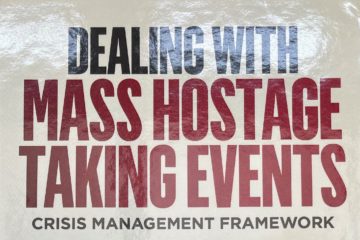Crisis Negotiations: Managing Critical Incidents and Hostage Situations in Law Enforcement and Corrections, 6th Edition.
Described by Routledge as an invaluable resource for mitigating, managing, or responding to high risk negotiation incidents:
This revision includes the current research on negotiating high-risk incidents in the classroom and the field. It includes an applied analysis of the value of psychopathology to high-risk perpetrators. It refines the “empirical eclecticism” introduced in the fourth edition to provide a conceptual basis for crisis negotiations. The authors include summary bullet points at the end of each chapter for easy reference when negotiators are in the field and a review of the literature since the last edition appeared. Their discussion of the strategic planning process involved in high-risk negotiation incidents focuses clearly on the critical questions negotiators need to ask themselves about any high-risk incident and provides a practical approach to the psychology of individuals that engage in high-risk incidents.
Known as “the bible” to experienced professionals in the field, this sixth edition of Crisis Negotiations is vital for practitioners as well as for criminology, criminal justice or psychology courses in crisis management, applied psychology, and special operations in law enforcement and corrections. Instructors will find it well supported by ancillary materials including discussion questions, slide presentations, and a test bank, as well as case studies and self-assessment quizzes for students, making it easy to develop a first-time course or to integrate it into an existing course.
I revised sections on Maritime Negotiations and Negotiating with Protest Movements to guide negotiators on the numerous challenges and proven tactics to engage with subject(s) in such environments, not only to de-escalate but also to negotiate a peaceful resolution.
But perhaps, it has been my section on Negotiating with Martyrs that has caused much debate on how to deal with one of the most challenging aspects of that human interaction between negotiator and a subject who wishes to martyr themselves for a greater cause than life itself. This has been derived not only from research but also ‘field’ experience working with a deep faith INGO across the world. Giving the reader both a Christian & Islamic perspective, I encourage them to consider the motivations and the understanding of the subject’s cause that leads them into what are often described as martyr operations. With this insight and a greater understanding of the subject’s mindset, gives the negotiator that slim opportunity to engage in dialogue and persuade them towards a more peaceful resolution that pays respect to their cause.


